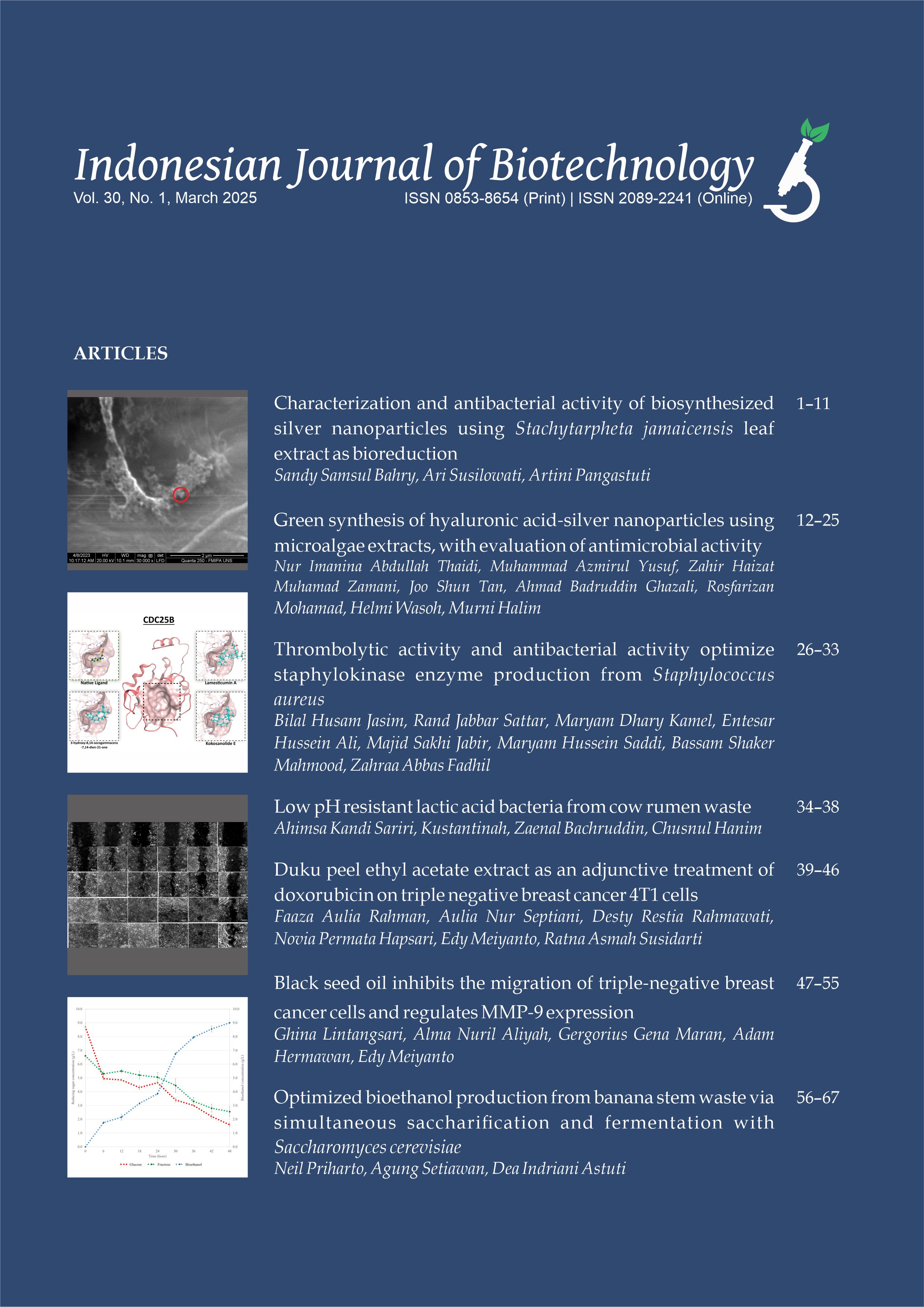Biodegradable plant pots made from dried banana pseudo‐stems enriched with a Bacillus sp.‐biochar composite as an eco‐friendly alternative to plastic pots
Parisatcha Sangsuwan(1*), Janejira Detraksa(2), Pranitda Inchomrit(3)
(1) Biology Department, Faculty of Science and Technology, Thepsatri Rajabhat University, Lop Buri, 15000, Thailand
(2) Biology Department, Faculty of Science and Technology, Thepsatri Rajabhat University, Lop Buri, 15000, Thailand
(3) Environmental Department, Faculty of Science and Technology, Thepsatri Rajabhat University, Lop Buri, 15000, Thailand
(*) Corresponding Author
Abstract
Agricultural plastic waste is a major environmental pollutant due to its non‐biodegradable nature. This study discusses the production of biodegradable pots (bio‐pots) using a biochar composed of banana pseudo‐stems and Bacillus sp. The isolated Bacillus sp. produced indole‐3‐acetic acid (IAA), solubilized potassium and phosphate, and secreted siderophores immobilized in banana pseudo‐stem biochar. X‐ray diffraction analysis revealed CaCO3 and KCl as the major elements, aside from carbon, released to the soil. Bio‐pots were made from banana pseudo‐stem biochar mixed with a Bacillus sp.–biochar composite at various formulations: 0%, 1%, 3%, 5%, and 10%. Mechanical testing indicated that the porous structure of the biochar contributed to low pot density and tensile strength. Moreover, the air‐filled spaces within the biochar enhanced water absorption, correlating with the amount of biochar used. Marigolds were cultivated outdoors in the bio‐pots to assess growth and yield. Our findings showed that those grown in biopot‐4 (10%) displayed improved growth and yield compared to the control group (grown in the ground). After 10 weeks, the control plants became infected with fungi and aphids, whereas those grown in biopot‐4 remained unaffected. In summary, bio‐pots incorporating 10% Bacillus sp.–biochar are eco‐friendly, reducing the need for chemical fertilizers, fungicides, and insecticides, while contributing to environmental sustainability. Moreover, the combination of biochar and Bacillus sp. is more effective than an unmixed form, since Bacillus sp. can inhabit and propagate in biochar pores if the conditions are otherwise unsuitable for growth.
Keywords
Full Text:
PDFReferences
Bigatton E, Castillejo M, Ayoub I, Baldessari J, Marina B, Archilla M, Lucas D, Lucini E, Haro R. 2024. Plant growth promoting rhizobacteria (PGPR): Impact on peanut flowering, seed physical quality, and yield determination (Arachis hypogaea L.). Ind. Crops Prod. 219:119024. doi:10.1016/j.indcrop.2024.119024.
Devi S, Sharma S, Tiwari A, Bhatt AK, Singh NK, Singh M, Kaushalendra, Kumar A. 2023. Screening for multifarious plant growth promoting and biocontrol attributes in Bacillus strains isolated from indo gangetic soil for enhancing growth of rice crops. Microorganisms 11(4):1085. doi:10.3390/microorganisms11041085.
Fatimah S, Ragadhita S, Husaeni DFA, Nandiyanto ABD. 2022. How to calculate crystallite size from xray diffraction (XRD) using Scherrer method. ASEAN J. Sci. Eng. 2(1):65–76.
Flaviano T, Bernardo MHJB, Angelica G, Gabriele C, Fabrizio L, Walter P, Cristiano P, Clemencia CL, Fabio S. 2025. Impact of organic and conventional cropping systems on plant growthpromoting rhizobacteria (PGPR). Biocatal. Agric. Biotechnol. 64:103527. doi:10.1016/j.bcab.2025.103527.
Fuentes RA, Berthe JA, Barbosa SE, Castillo LA. 2021. Development of biodegradable pots from different agroindustrial wastes and byproducts. Sustain. Mater. Technol. 30:e00338. doi:10.1016/j.susmat.2021.e00338.
Hashmi AI, Iqtedar M, Saeed H, Ahmed N, Abdullah R, Kaleem A, Abbasi MA. 2025. Characterization of soilderived Bacillus subtilis metabolites against breast cancer: In vitro and in silico studies. Saudi Pharm. J. 33(12):3. doi:10.1007/s44446025000066.
Huang H, Reddy NG, Huang X, Chen P, Wang P, Zhang Y, Huang Y, Lin P, Garg A. 2021. Effects of pyrolysis temperature, feedstock type and compaction on water retention of biochar amended soil. Sci. Rep. 11:7419. doi:10.1038/s41598021867015.
Hussein K, Yoo J, Joo J. 2016. Tolerance to salt stress by plant growthpromoting rhizobacteria on Brassica rapa var. glabra. Korean J. Soil Sci. Fertil. 49(6):776– 782. doi:10.7745/KJSSF.2016.49.6.776.
Ippolito F. 2016. Biochar as a new soil amendment to promote plant growth and disease control. Doctoral thesis, University of Naples Federico II, Naples, Italy.
Jaya JD, Elma M, Sunardi S, Nugroho A. 2022. Physical and mechanical properties of biodegradable pot derived from oil palm empty fruit bunch and sodium alginate. Braz. Arch. Biol. Technol. 65:e22210789. doi:10.1590/167843242022210789.
JuangaLabayen JP, Yuan Q. 2021. Making biodegradable seedling pots from textile and paper wastepart B: Development and evaluation of seedling pots. Int. J. Environ. Res. Public Health 18(14):7609. doi:10.3390/ijerph18147609.
Kaewmanee J. 2021. The production of biodegradable flowerpot from sludge of rubber factory with waste from mushroom culture and palm bunches. ASEAN J. Sci. Technol. Rep. 24(1):84–93. doi:10.55164/ajstr.v24i1.240816.
Kaki AA, Chaouche NK, Dehimat L, Milet A, Youcef Ali M, Ongena M, Thonart P. 2013. Biocontrol and plant growth promotion characterization of Bacillus species isolated from Calendula officinalis rhizosphere. Indian J. Microbiol. 53:447–452. doi:10.1007/s12088 0130395y.
Leng L, Xiong Q, Yang L, Li H, Zhou Y, Zhang W, Jiang S, Li H, Huang H. 2021. An overview on engineering the surface area and porosity of biochar. Sci. Total Environ. 763:144204. doi:10.1016/j.scitotenv.2020.144204.
Ningthoujam D, Sanasam S, Tamreihao K, Salam N. 2009. Antagonistic activities of local actinomycete isolates against rice fungal pathogens. Afr. J. Microbiol. Res. 3(11):737–742. URL http://www.academicjournals.o rg/ajmr.
Overvoorde P, Fukaki H, Beeckman T. 2010. Auxin control of root development. Cold Spring Harb. Perspect. Biol. 2(6):a001537. doi:10.1101/cshperspect.a001537.
Pan L, Cai B. 2023. Phosphatesolubilizing bacteria: Advances in their physiology, molecular mechanisms and microbial community effects. Microorganisms 11(12):2904. doi:10.3390/microorganisms11122904.
Panda A, Dash A, Mishra BB. 2021. Potassium mobilization and plant growth promotion by soil bacteria isolated from different agroclimatic zones of Odisha, India. Acta Agric. Slov. 117:1–14. doi:10.14720/aas.2021.117.3.1794.
Phat TD, Diep CN. 2021. Influence of two phosphatepotassium solubilizing bacterial species on biomass and nitrate concentration on mustard greens (Brassica juncea (L.) Czernjaew) cultivated on acid sulfate soils. GSC Biol. Pharm. Sci. 16(3):155–163. doi:10.30574/gscbps.2021.16.3.0278.
Phringpaen W, Aiedhet W, Thitithanakul S, Kanjanasopa D. 2023. Ability of phosphatesolubilizing bacteria to enhance the growth of rice in phosphorusdeficient soils. Trends Sci. 20(12):7032. doi:10.48048/tis.2023.7032.
Porto J, Rebouças T, José A, José A, Destefano S, Vargas A. 2022. Antagonist species to Streptomyces sp. that causes common potato scab. Braz. Arch. Biol. Technol. 65(5). doi:10.1590/167843242022210059.
Rafee SNAM, Lee YL, Jamalludin MR, Razak NA, Makhtar NL, Ismail RL. 2019. Effect of different ratios of biomaterials to banana peels on the weight loss of biodegradable pots. Acta Technol. Agric. 22(1). doi:10.2478/ata20190001.
Rais A, Jabeen Z, Shair F, Hafeez FY, Hassan MN. 2017. Bacillus spp., a biocontrol agent enhances the activity of antioxidant defense enzymes in rice against Pyricularia oryzae. PLoS One 12(11):e0187412. doi:10.1371/journal.pone.0187412.
Rais A, Shakeel M, Hafeez FY, Hassan MN. 2016. Plant growth promoting rhizobacteria suppress blast disease caused by Pyricularia oryzae and increase grain yield of rice. BioControl 61:769–780. doi:10.1007/s105260169763y.
Rais A, Shakeel M, Malik K, Hafeez FY, Yasmin H, Mumtaz S, Hassan MN. 2018. Antagonistic Bacillus spp. reduce blast incidence on rice and increase grain yield under field conditions. Microbiol. Res. 208:54–62. doi:10.1016/j.micres.2018.01.009.
Raji M, Thangavelu M. 2021. Isolation and screening of potassium solubilizing bacteria from saxicolous habitat and their impact on tomato growth in different soil types. Arch. Microbiol. 203(6):3147–3161. doi:10.1007/s00203021022849.
Saraf M, Pandya U, Thakkar A. 2014. Role of allelochemicals in plant growth promoting rhizobacteria for biocontrol of phytopathogens. Microbiol. Res. 169(1):18–29. doi:10.1016/j.micres.2013.08.009.
Sham S, Ravindra K, Akash T, Puru S, Jitender S, Shishu S. 2020. Isolation and identification of Bacillus species from soil for phosphate, potassium solubilisation and amylase production. Int. J. Curr. Microbiol. Appl. Sci. 9:415–426. doi:10.20546/ijcmas.2020.905.046.
Sood Y, Singhmar R, Singh V, Malik DK. 2023. Isolation and characterization of potential potassium solubilizing bacteria with various plant growth promoting traits. Biosci. Biotechnol. Res. Asia 20(1):79–84. doi:10.13005/bbra/3070.
Tomadoni B, Merino D, Casalongué C, Alvarez V. 2020. Biodegradable materials for planting pots. Mater. Res. Found. 68:85–103. doi:10.21741/97816449006594.
Usman ARA, Abduljabbar A, Vithanage M, Ok YS, Ahmad M, Ahmad M, Elfaki J, Abdulazeem SS, AlWabel MI. 2015. Biochar production from date palm waste: Charring temperature induced changes in composition and surface chemistry. J. Anal. Appl. Pyrolysis 115:392–400. doi:10.1016/j.jaap.2015.08.016.
Wagi S, Ahmed A. 2019. Bacillus spp.: Potent microfactories of bacterial IAA. PeerJ 7:e7258. doi:10.7717/peerj.7258.
Wu F, Li J, Chen Y, Zhang L, Zhang Y, Wang S, Shi X, Li L, Liang J. 2019. Effects of phosphate solubilizing bacteria on the growth, photosynthesis, and nutrient uptake of Camellia oleifera Abel. Forests 10(4):348. doi:10.3390/f10040348.
Yang T, Law DM, Davies PJ. 1993. Magnitude and kinetics of stem elongation induced by exogenous indole 3acetic acid in intact lightgrown pea seedlings. Plant Physiol. 102(3):717–724. doi:10.1104/pp.102.3.717.
Zhou H, Ren ZH, Zu X, Yu XY, Zhu HJ, Li XJ, Zhong J, Liu EM. 2021. Efficacy of plant growthpromoting bacteria Bacillus cereus YN917 for biocontrol of rice blast. Front. Microbiol. 12:684888. doi:10.3389/fmicb.2021.684888.
Article Metrics
Refbacks
- There are currently no refbacks.
Copyright (c) 2025 The Author(s)

This work is licensed under a Creative Commons Attribution-ShareAlike 4.0 International License.









